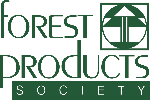Estimating Upper Percentiles of Strand Thickness for Oriented Strand Board
Statistical reliability methods are applied to estimate the upper percentiles of strand thickness for the face layers of oriented strand board (OSB) panels manufactured from six mills in the Eastern United States. The influence of thick strands on OSB properties (thickness swell, TS; internal bond, IB; and modulus of rupture, MOR) has been well documented. However, there is an absence in the literature of characterizing wood strand thickness for OSB mills in the context of statistical reliability methods. With induced percentile left censoring for improved model fitting, bootstrapping methods are employed for better estimating the upper percentiles and confidence intervals for strand thickness. The upper percentiles of flakes may be costly, damage equipment, or cause dimensional instability in OSB.
The distributions of wood strands were nonnormal, and best-fit distributions varied from the log-logistic, largest extreme value, lognormal, and Weibull. The mean and median strand thicknesses for all mills were 0.0322 inches (0.8179 mm) and 0.0310 inches (0.7874 mm), respectively. The coefficient of variation for all mills was 39.1 percent. Parametric bootstrap confidence intervals for the 95th percentile with no censoring varied in length from 0.0009 inches (0.0229 mm) to 0.0145 inches (0.3683 mm). Nonparametric bootstrap confidence intervals for the 95th percentile with no censoring varied in length from 0.0005 inches (0.0127 mm) to 0.0225 inches (0.5175 mm). Study results were strengthened from the validation study in that the training intervals were either contained within, or overlapped, the validation intervals.
Contributor Notes
The authors are, respectively, Associate Professor, Forest Products Center, Univ. of Tennessee, Knoxville (tmyoung1@utk.edu); and Professor, former Graduate Research Assistant, and Associate Professor, Dept. of Statistics, Operations, and Management Sci., Univ. of Tennessee, Knoxville (fguess@utk.edu, jchasta4@utk.edu, rleon@utk.edu). This paper was received for publication in May 2009. Article no. 10630.
*Forest Products Society member.
